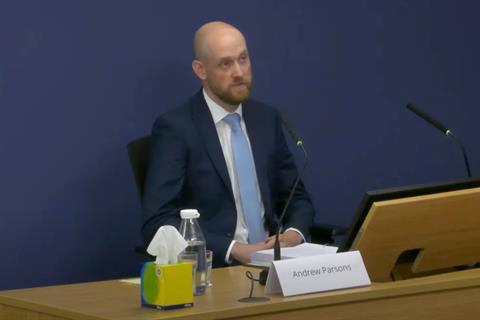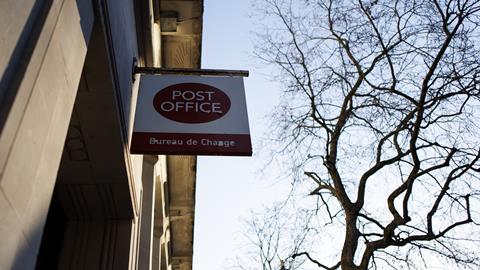Womble Bond Dickinson partner Andy Parsons, who led the defence in the Bates litigation, returns for a second day of oral evidence at the Post Office Inquiry
12.50pm: Parsons' evidence wraps up with questions from Gareth Jenkins' representative. The inquiry returns next Tuesday when it will hear from the forensic accountants Second Sight whose work helped to bring out this scandal.
12.30pm: Henry says a rationale for limited disclosure was devised by the Post Office and its advisers. This potentially revealed Gareth Jenkins to be an unreliable expert, and Parsons was aware of this issue.
The inquiry sees an email written in 2013 by Parsons on the issue of disclosure of Jenkins. He said the Helen Rose report suggested it was ‘widely known that there were problems with Horizon’ which ‘could be used to attack Gareth Jenkin’s credibility as POL’s Horizon expert as he had previously stated that there were no problems with Horizon’. This was based on advice from criminal lawyers.
We then see an email from Simon Clarke of Cartwright King which stated that the ‘disclosure issue remains that relating to the credibility of GJ as a witness only’.
Parsons accepts there was a credibility issue with Jenkins’ evidence. Henry asks why Parsons did not see it as ‘extraordinary’ that criminal lawyers were not flagging up this issue for disclosure. He says it did not cross his mind at the time.
12.20pm: Henry looks at discussions in 2013 about whether to reopen the Seema Misra case. Misra (pictured below) had been jailed for 15 months in 2010 based on oral evidence from expert witness Gareth Jenkins, who had not disclosed knowledge of bugs in Horizon at the time.
The inquiry sees a briefing note provided by Bond Dickinson in July 2013 for Post Office chief executive Paula Vennells. It addresses what it calls the ‘two anomalies’ found with Horizon and mentions the Misra case. Parsons accepts he had a ‘fundamental duty’ to uphold justice as a solicitor but he did not question at the time whether doubts about Horizon and Jenkins should be disclosed to Misra’s lawyers. He instead followed the advice of criminal lawyers for the Post Office.
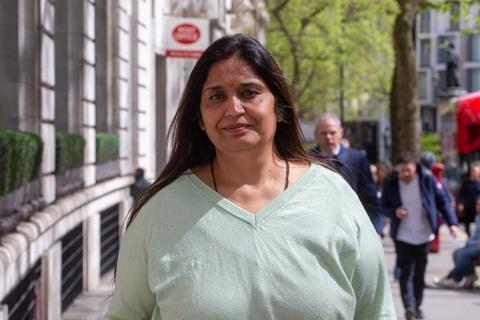
12.15pm: When the mediation finished, Second Sight returned its emails to the Post Office. There is evidence shown to the inquiry that Bond Dickinson had trawled these emails and Parsons was concerned the forensic accountants had been passing on information to Alan Bates.
Around the same time, Parsons emailed Post Office chiefs that he had been in touch with Second Sight’s Ron Warmington about sharing any information it had accrued.
Parsons wrote: ‘I have gently warned him that he needs to be careful about anything he says in relation to criminal prosecutions as such comments are under heavy scrutiny and will have consequences.’
12.10pm: Henry says there was dam of hundreds of postmasters who were victims of the Post Office. Internal documents show lawyers – not Parsons – talking about the risk of opening the floodgates to potential claims by reviewing Horizon.
Henry says Parsons was part of the policy pursued by Bond Dickinson of keeping everything at bay. He says this is not correct. Henry takes Parsons to a document he himself wrote saying there was a risk of opening the floodgates, using those exact words.
12.05pm: Henry suggests Parsons failed to confront 'yawning gaps' in the Post Office position. The inquiry then hears that Parsons has not been able to find any notes he might have taken from a meeting with other more senior lawyers in 2014. The KC suggests that those notes which have been retained by Womble Bond Dickinson are 'sanitised' and leave out key things that were said at the time by leading counsel.
11.55am: Ed Henry KC begins his questions and gives it with both barrels.
He begins: 'You didn't make any mistakes at all. There were errors of judgement obviously and there were very serious departures from standards that ought to have applied, but what you did was deliberate, it was clear-sighted, it was ruthless.'
There is a pause before Parsons asks if this is a question. Henry stares and nods.
Parsons replies: 'I am a lawyer acting for Post Office. As a lawyer it is my responsibility to defend their interests. For a large part of my engagement my instructions were that they considered the Horizon system to be reliable and therefore I defended it along those lines.'
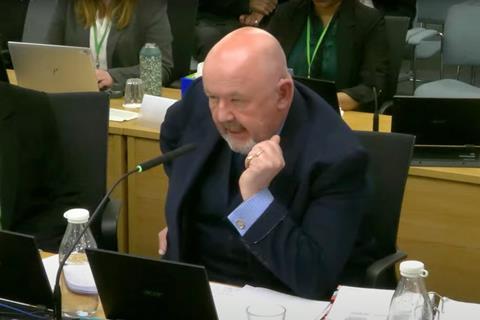
11.50am: Jacobs says he had an email from one client this morning saying Parsons' evidence had been the 'absolutely epitome of arrogance, deceit and corporate corruption'. She called it an 'absolute disgrace'.
Parsons responds: 'I have apologised in my statement and just to make it clear I will apologise now. During my time acting for Post Office we made some mistakes along the way... I recognise the suffering of some of the sub-postmasters and to the extent that mistakes I made contributed to that I apologise.'
11.40am: Jacobs says any offers that were made were derisory. He recalls Alan Bates' evidence that mediation was nothing more than a fishing expedition to find out what sub-postmasters knew about Horizon.
Turning to Parsons, Jacobs says: 'You supervised this. You were using the mediation scheme in an adversarial way in order to obtain some sort of tactical advantage against the sub-postmasters.'
Parsons replies: 'I don't recognise that description of the mediation scheme. My understanding is Post Office went into it in good faith with an intention to reinvestigate the 150 cases. Where those cases involved errors on Post Office's part it was willing to settle.'
11.35am: Jacobs moves on to the mediation scheme, where Bond Dickinson was present throughout and advised the Post Office. It would ultimately fail.
Jacobs says one of his clients, Peter Holloway, was told after a day of negotiations by the mediator that Post Office was refusing to make an offer and that its representatives had been sent with the express instructions not to settle. This message was given to at least a dozen other sub-postmasters taking part in the scheme. Parsons says each case was assessed and in some Bond Dickinson advised that offers should be made. In those where no offer was to be made, it was decided to attend the mediation anyway to discuss issues.
Parsons adds: 'I can understand why that would have been frustrating for some of your clients but it was a decision taken in good faith at the time.'
11.25am: Jacobs says the Helen Rose report was ‘effectively a Pandora’s box’ for claimant solicitors because it would enable them to challenge the Post Office. He says knowledge of the Rose report would have had an ‘enormous impact’.
Parsons points out the sub-postmasters had a copy of the Rose report, but he accepts that Gareth Jenkins’ name was redacted from it. Parsons also advised at the time that Jenkins’ name should stay redacted, but he says that was just passing on advice from Post Office criminal lawyers.
Jacobs says different decisions on disclosure could have ended victims’ misery some 10 years ago: Parsons accepts this.
11.15am: In 2014, Parsons sent this advice to the Post Office warning about the prospect of an internal review (the Helen Rose report) becoming widely known. Rose had said in her report there were doubts about prosecution expert Gareth Jenkins. Parsons advised to 'down play' the important of the report in any correspondence with lawyers for sub-postmasters. Jacobs says this clearly shows that Parsons was concerned that the truth was about to get out.
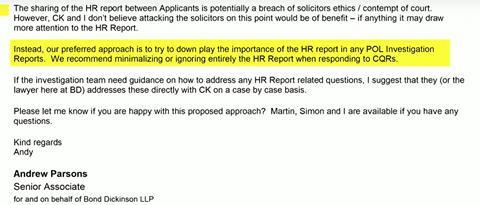
11.05am: Jacobs: 'Did you conspire with your client to downplay important matters so as to keep sub-postmasters in the dark about the very issues which have given rise to this public scandal?'
Parsons: 'I never conspired with my client in that regard. We would consider each matter as it came up. Some issues we thought were more important than others, some issues we would emphasise more than others, and some issues which we consider irrelevant we would de-emphasise.'
11am: Jacobs says his clients watching in person and at home believe that Parsons became too close to the Post Office.
The barrister continues: 'You had a client which was behaving badly but instead of taking a step back, you joined in and helped them, essentially throwing sub-postmasters under the bus... are you now able to accept that is what you did?'
Parsons replies: 'Back at the time I accept that some of the language I used was too strong. I look back on some of the decisions we made and think we could have made different decisions.
'As I say in my statement I apologise for the mistakes that my firm made along the way.
'At the beginning of the process I understood Post Office to have a fairly arguable case that Horizon worked. As a result of that and being their lawyers, I am required to advance that case on their behalf.'
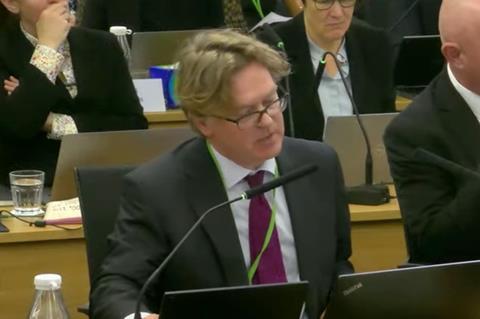
10.50am: We are going to move on to questions from sub-postmasters' representatives. Christopher Jacobs, representing 156 individuals and instructed by Howe & Co, will have half an hour, before Ed Henry KC, representing five individuals and instructed by Hodge Jones and Allen, has a further hour and 10 minutes.
10.40am: Blake moves on to the issue of information being shared by Post Office to the government. Meeting notes show that the Post Office wanted the sharing of papers to be 'kept to a minimum'. Blake points out the ideas expressed in the notes of saying things rather than writing them down is similar to Parsons' advice covered in the inquiry yesterday. Parsons says there was a general concern in the Post Office about sharing confidential information with government officials as they might then be shared elsewhere.
10.30am: Parsons stresses that talk of claimants being forced to burn money was a 'strawman discussion amongst lawyers' and never a recommended strategy. Although he says that Post Office in-house lawyer Rodric Williams did see these discussions.
He says: 'I don't believe this actually ended up being advice to a client. Rodric Williams understood as an experienced in-house litigator that this was just some ideas being knocked around by the legal team, not a set idea of how to proceed. It is a starter for ten amonst the legal team.'
Inquiry counsel Julian Blake reads from Mr Justice Fraser's eventual judgment: 'The Post Office has appeared determined to make this litigation, and therefore resolution of this intractable dispute, as difficult and expensive as it can.'
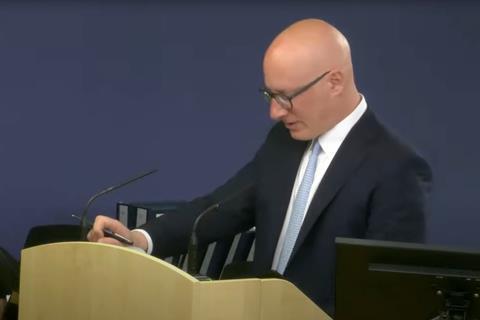
10.20am: In 2018, Parsons wrote to the counsel team setting out his thoughts on future trials of Horizon issues. He caveated the email by saying ‘we need to find a way forward so we all need a positive (if deluded) mental attitude!’
One of the challenges/factors to consider, Parsons set out, was about the Post Office’s financial strength compared to the claimants’.
He wrote: ‘We undoubtedly have more bench-strength, but every task is much more onerous for us (our disclosure is at least 10 times larger than the Cs; we will have loads of witnesses, they will have a few, etc). That said, my instinct is that the Cs funding is under pressure and they do not want to be burning money on a third trial.’
Parsons says this was not a turning point but an ‘impression we began to have around this time’.
The inquiry then sees the next part of the email, where Parsons said the best tactic was to target limitation issues and ‘to force the Cs to burn money’. He wanted to achieve these objectives ‘whilst trying not to look tactical’.
10.15am: The inquiry see this litigation strategy produced for the Post Office by Bond Dickinson in 2017. Parsons says he was the primary author. Now the 'better solution' is to force the claimants into a collective position, targeting claimant firm Freeths, the litigation funders and the insurers.
Parsons agrees this is not advocating attrition but a 'merit-based strategy'. He says this became a bigger issue as it looked like the claimants were 'struggling'.
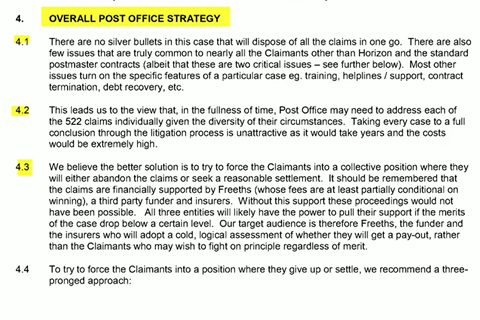
10.05am: In his witness statement, Parsons says he did not advocate an attritional litigation strategy just to force the Post Office to incur costs.
He wrote: 'Applying a reasonable degree of pressure to one's opponent, and/or pursuing strategies which have the effect of applying pressure to one's opponent, are part and parcel of an adversarial system of litigation.
'It was proper to include this so POL could see the full range of options. However, at no stage did I recommend that POL adopt this strategy and at no stage did POL instruct me to adopt such a strategy.'
10am: Inquiry sees a litigation strategy produced for a steering group meeting in September 2017. Parsons confirms it was either him or someone in his team who wrote it.
Under one heading of ‘Attrition’, the strategy says one approach would be to ‘stretch out the litigation process so to increase costs in the hope that the claimants, and more particularly their litigation funders, decide that it is too costly to pursue the litigation and give up’.
The document said this option was not recommended as the costs to Post Office would ‘become unbearable before the claimants give up’.
It added that media reporting may increase as the litigation continued and put people off being postmasters.
Parsons confirms the position at this stage was not to let the litigation drag out.
9.55am: Julian Blake tells Parsons he needs about another hour to go through some miscellaneous items, mostly relating to the group litigation brought by sub-postmasters. He starts by looking at emails exchanged by lawyers working for Post Office where they discussed the reluctance of one defence witness, Steve Parker, to give a statement.
Parsons told colleagues: 'There isn’t an alternative to witness evidence. We could look at summonsing Steve but that would be far from ideal.'
